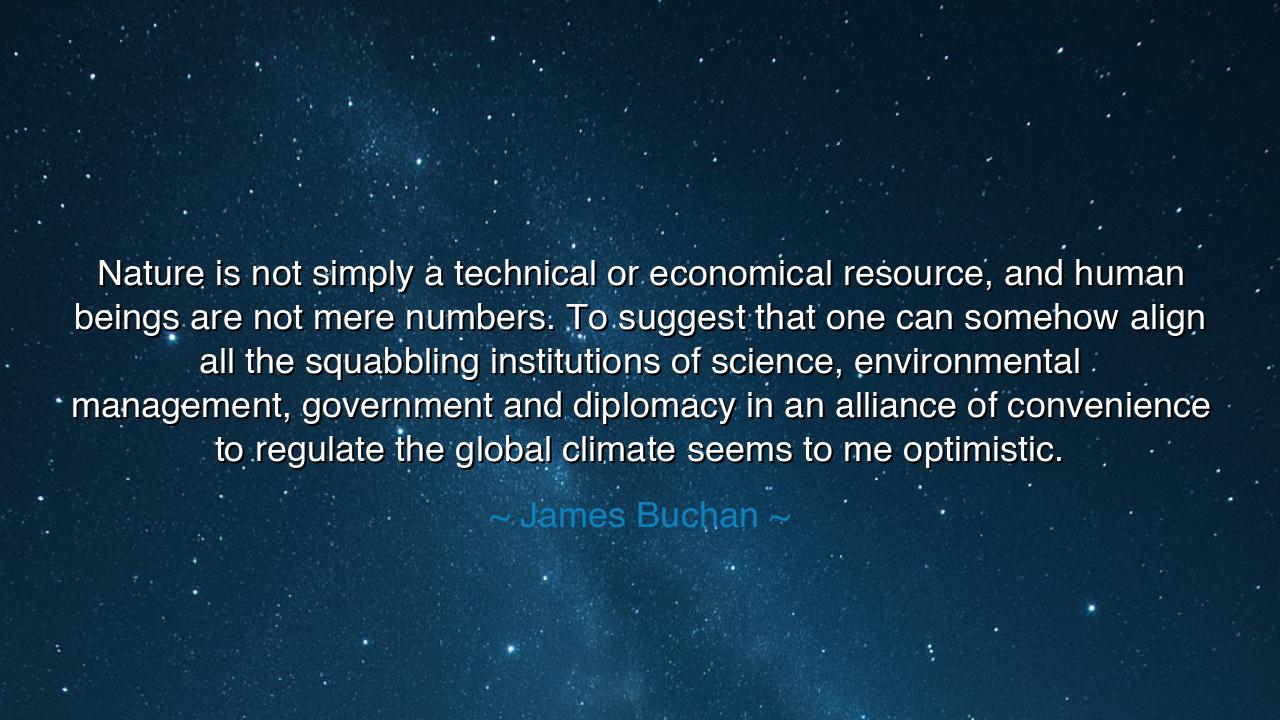
Nature is not simply a technical or economical resource, and
Nature is not simply a technical or economical resource, and human beings are not mere numbers. To suggest that one can somehow align all the squabbling institutions of science, environmental management, government and diplomacy in an alliance of convenience to regulate the global climate seems to me optimistic.






Hear, then, the words of James Buchan: “Nature is not simply a technical or economical resource, and human beings are not mere numbers. To suggest that one can somehow align all the squabbling institutions of science, environmental management, government and diplomacy in an alliance of convenience to regulate the global climate seems to me optimistic.” In this saying lies a deep reminder: that the living world cannot be reduced to figures on a parchment, nor the human spirit weighed on the scales of bureaucracy. His is the voice of one who sees both the majesty of the earth and the frailty of humankind’s efforts to tame it.
When Buchan speaks of nature, he calls us to remember that the mountains, the seas, the forests, and the winds are not mere stores of fuel or ledgers of profit. They are the breath of existence itself. To treat them as commodities is to forget their sacredness. Just as the ancients looked to the sun with reverence, knowing their crops and their lives depended upon its warmth, so too must we look upon nature with awe, not as a servant but as a companion in the great journey of survival. His words strike at the arrogance of an age that seeks to command the skies and oceans through agreements and treaties, as if the storm would bow to ink upon paper.
The second truth of his declaration is about human beings. In an era where the powerful often speak of populations as data, as percentages and graphs, Buchan reminds us that every number is a soul, every statistic a story. To think otherwise is to strip humanity of its dignity. Recall the tragedy of the Irish Famine of the 19th century. Reports spoke of “numbers lost” and “tons of food exported,” yet behind each number lay a mother who buried her child, a father who left his homeland in despair, a people torn from the soil that fed them. In forgetting the human face behind the number, leaders failed to act with compassion. Buchan’s words echo as a warning: never allow the human heart to be erased by the ledger.
His skepticism about aligning science, government, diplomacy, and management is born from the knowledge of history. For have we not seen kingdoms fall because their councils quarreled, even while enemies stood at the gates? The League of Nations after the Great War was formed to preserve peace, yet its voices bickered, its members faltered, and in their disunity the shadow of a second war rose. So too in our own age: while nations gather to discuss the climate, promises are made, then broken; resolutions proclaimed, then ignored. Buchan does not condemn these efforts outright, but he cautions us to recognize the immense difficulty of binding many divided wills into one steadfast purpose.
And yet, his words are not to breed despair but to awaken humility. For though the task of uniting nations may seem impossible, it is not unworthy. To strive, even in the face of discord, is noble. The lesson is not to abandon the struggle, but to temper hope with realism, and optimism with vigilance. Just as a sailor does not command the sea but learns to navigate its tempests, so too must humanity learn to move carefully within the forces of nature, without presuming mastery over them.
The teaching for future generations is clear: honor the earth as more than a resource, honor each person as more than a number, and beware the illusion that vast institutions can easily unite. Instead, begin with smaller acts—care for your soil, guard your water, respect your neighbor. From such roots, stronger bonds may grow. For great change is not born in treaties alone, but in the hearts of countless individuals who act with reverence and responsibility.
Therefore, let your actions be these: plant a tree, for it is a prayer in living form. Reduce your waste, for every act of restraint honors the environment. Support leaders who protect the vulnerable, for without compassion no pact will stand. And above all, never lose sight of the truth that behind every policy are people, and behind every statistic is life. The earth shall not be healed by numbers alone, but by love, wisdom, and endurance.
Take courage, then, for Buchan’s words are both caution and call. Though it may be “optimistic” to think all powers will align in harmony, it is never too much to hope that individuals—each heart, each hand—can sow the seeds of renewal. Let the wise remember: no council of kings can calm the storm, but a people who honor the earth may yet weather it together.






AAdministratorAdministrator
Welcome, honored guests. Please leave a comment, we will respond soon